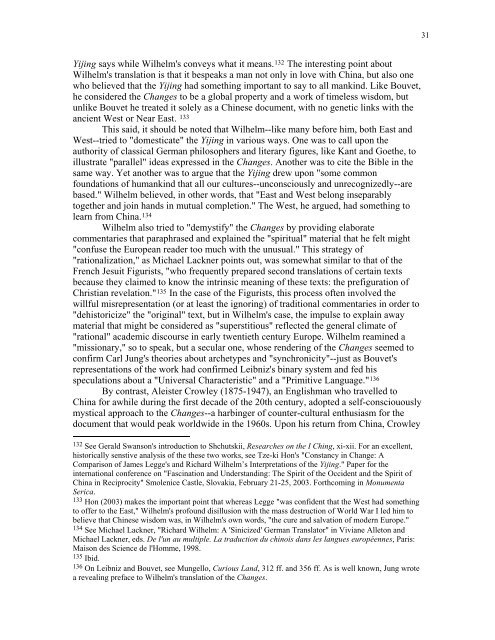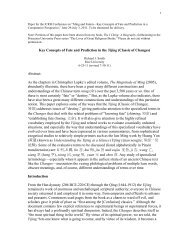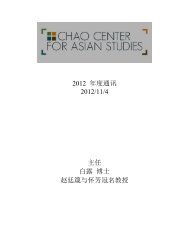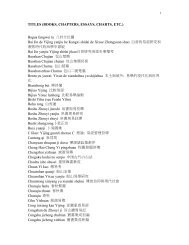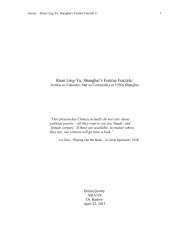Jesuit Interpretations of the Yijing - Chao Center for Asian Studies ...
Jesuit Interpretations of the Yijing - Chao Center for Asian Studies ...
Jesuit Interpretations of the Yijing - Chao Center for Asian Studies ...
You also want an ePaper? Increase the reach of your titles
YUMPU automatically turns print PDFs into web optimized ePapers that Google loves.
31<br />
<strong>Yijing</strong> says while Wilhelm's conveys what it means. 132 The interesting point about<br />
Wilhelm's translation is that it bespeaks a man not only in love with China, but also one<br />
who believed that <strong>the</strong> <strong>Yijing</strong> had something important to say to all mankind. Like Bouvet,<br />
he considered <strong>the</strong> Changes to be a global property and a work <strong>of</strong> timeless wisdom, but<br />
unlike Bouvet he treated it solely as a Chinese document, with no genetic links with <strong>the</strong><br />
ancient West or Near East. 133<br />
This said, it should be noted that Wilhelm--like many be<strong>for</strong>e him, both East and<br />
West--tried to "domesticate" <strong>the</strong> <strong>Yijing</strong> in various ways. One was to call upon <strong>the</strong><br />
authority <strong>of</strong> classical German philosophers and literary figures, like Kant and Goe<strong>the</strong>, to<br />
illustrate "parallel" ideas expressed in <strong>the</strong> Changes. Ano<strong>the</strong>r was to cite <strong>the</strong> Bible in <strong>the</strong><br />
same way. Yet ano<strong>the</strong>r was to argue that <strong>the</strong> <strong>Yijing</strong> drew upon "some common<br />
foundations <strong>of</strong> humankind that all our cultures--unconsciously and unrecognizedly--are<br />
based." Wilhelm believed, in o<strong>the</strong>r words, that "East and West belong inseparably<br />
toge<strong>the</strong>r and join hands in mutual completion." The West, he argued, had something to<br />
learn from China. 134<br />
Wilhelm also tried to "demystify" <strong>the</strong> Changes by providing elaborate<br />
commentaries that paraphrased and explained <strong>the</strong> "spiritual" material that he felt might<br />
"confuse <strong>the</strong> European reader too much with <strong>the</strong> unusual." This strategy <strong>of</strong><br />
"rationalization," as Michael Lackner points out, was somewhat similar to that <strong>of</strong> <strong>the</strong><br />
French <strong>Jesuit</strong> Figurists, "who frequently prepared second translations <strong>of</strong> certain texts<br />
because <strong>the</strong>y claimed to know <strong>the</strong> intrinsic meaning <strong>of</strong> <strong>the</strong>se texts: <strong>the</strong> prefiguration <strong>of</strong><br />
Christian revelation." 135 In <strong>the</strong> case <strong>of</strong> <strong>the</strong> Figurists, this process <strong>of</strong>ten involved <strong>the</strong><br />
willful misrepresentation (or at least <strong>the</strong> ignoring) <strong>of</strong> traditional commentaries in order to<br />
"dehistoricize" <strong>the</strong> "original" text, but in Wilhelm's case, <strong>the</strong> impulse to explain away<br />
material that might be considered as "superstitious" reflected <strong>the</strong> general climate <strong>of</strong><br />
"rational" academic discourse in early twentieth century Europe. Wilhelm reamined a<br />
"missionary," so to speak, but a secular one, whose rendering <strong>of</strong> <strong>the</strong> Changes seemed to<br />
confirm Carl Jung's <strong>the</strong>ories about archetypes and "synchronicity"--just as Bouvet's<br />
representations <strong>of</strong> <strong>the</strong> work had confirmed Leibniz's binary system and fed his<br />
speculations about a "Universal Characteristic" and a "Primitive Language." 136<br />
By contrast, Aleister Crowley (1875-1947), an Englishman who travelled to<br />
China <strong>for</strong> awhile during <strong>the</strong> first decade <strong>of</strong> <strong>the</strong> 20th century, adopted a self-consciouously<br />
mystical approach to <strong>the</strong> Changes--a harbinger <strong>of</strong> counter-cultural enthusiasm <strong>for</strong> <strong>the</strong><br />
document that would peak worldwide in <strong>the</strong> 1960s. Upon his return from China, Crowley<br />
132 See Gerald Swanson's introduction to Shchutskii, Researches on <strong>the</strong> I Ching, xi-xii. For an excellent,<br />
historically senstive analysis <strong>of</strong> <strong>the</strong> <strong>the</strong>se two works, see Tze-ki Hon's "Constancy in Change: A<br />
Comparison <strong>of</strong> James Legge's and Richard Wilhelm’s <strong>Interpretations</strong> <strong>of</strong> <strong>the</strong> <strong>Yijing</strong>." Paper <strong>for</strong> <strong>the</strong><br />
international conference on "Fascination and Understanding: The Spirit <strong>of</strong> <strong>the</strong> Occident and <strong>the</strong> Spirit <strong>of</strong><br />
China in Reciprocity" Smolenice Castle, Slovakia, February 21-25, 2003. Forthcoming in Monumenta<br />
Serica.<br />
133 Hon (2003) makes <strong>the</strong> important point that whereas Legge "was confident that <strong>the</strong> West had something<br />
to <strong>of</strong>fer to <strong>the</strong> East," Wilhelm's pr<strong>of</strong>ound disillusion with <strong>the</strong> mass destruction <strong>of</strong> World War I led him to<br />
believe that Chinese wisdom was, in Wilhelm's own words, "<strong>the</strong> cure and salvation <strong>of</strong> modern Europe."<br />
134 See Michael Lackner, "Richard Wilhelm: A 'Sinicized' German Translator" in Viviane Alleton and<br />
Michael Lackner, eds. De l'un au multiple. La traduction du chinois dans les langues européennes, Paris:<br />
Maison des Science de l'Homme, 1998.<br />
135 Ibid.<br />
136 On Leibniz and Bouvet, see Mungello, Curious Land, 312 ff. and 356 ff. As is well known, Jung wrote<br />
a revealing preface to Wilhelm's translation <strong>of</strong> <strong>the</strong> Changes.


